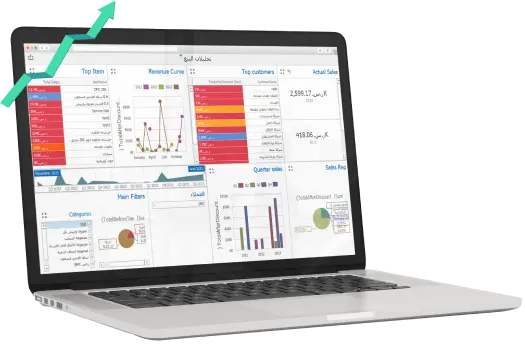In this part we are going to discuss cash flow statements from investing activitie
. There is a difference in listing the terms of operating activities cash flow statement in direct and indirect methods . But in investing activities the terms are listed in the same way in both methods
Cash flow statement from investing activities
Investing activities include a set of fixed assets being either bought or sold by the company , the company investments in other companies ( affiliated or sister ) and any other investments except trade investments which belong to operating activities
:First : Fixed assets and cash flow statement
Receipts and cash payments of fixed assets ,in the case of selling or purchasing ,are very essential in the cash flow statement . Consequently any credit selling or buying or capital gains or losses aren’t included in the investing activities cash flow statements as they were adjusted with earnings before tax .
Receipts from selling fixed assets
If the transactions of selling and buying involve few assets , You can get the receipts from your company accounting software . But if the company has sold a big number of assets (liquidation ) or bought many assets ( establishment ) , the receipts are calculated as follows
Book value of sold assets
= beginning balance of fixed assets + added assets – depreciation – ending balance of fixed assets
Cash receipts from selling fixed assets
= Book value of sold assets +capital losses or gains
Another method is to review a fixed assets list and figure out the assets exclusions subtract gross depreciation of excluded assets then you will come up with the net book value of the assets . If you have capital gains this means that the received amount is greater than the assets book value so you will add the gains to the book value to get the fixed assets receipts .
But if there is a capital loss then you have to subtract it from the book value .
Payments for fixed assets purchasing
General Ledger Software is helpful in calculating these payments if the number of bought assets is small and their value can be easily calculated by adding fixed assets with exclusion of completed projects in progress that transformed into fixed asset as they are considered non-cash transaction .In the case of an international standard the short term funded assets (non-cash transaction) is excluded as well as the assets bought on credit because what matters is the cash payments of fixed assets in a balance that can be used to calculate payments for fixed assets purchasing .
The cost of purchasing new assets
= fixed assets balance (end of the period ) – fixed assets balance (beginning of the period ) + depreciation +book value of sold assets ( if existed )
Concerning total bought assets list , there is a term of additions of fixed assets during the period
Additions may be purchasing an asset in cash ( on credit from a fixed asset supplier which is non –cash transaction), or transformed from projects in progress (non –cash transaction) or even a donation from the company holders (non –cash transaction).
Cash flow is concerned with payments and receipts only , namely the processes of paying and receiving any cash but not if the selling or purchasing process is not in cash or on credit and it is the same for the capital gains or loss .
Projects in progress
You can include any cash spent on projects in progress in one term of payments on projects in progress in the investing activities . But the fixed assets transformed from projects in progress after completion become a non-cash transaction and this wasn’t mentioned in the investing cash flow statement because it is internal from an account to another unless it causes any cash transaction .
In the cash flow statement it is better to separate payments for fixed assets purchasing and payments for projects in progress in two different terms . So the amounts of investments in both of them is clear for anyone who reads the statement .In addition he can figure out the receipts of selling fixed assets or payments for buying fixed assets or a project in progress foundation , if the accounts are organized accurately .
Preparing an investigating cash flow statement
The second type of investing cash flow statements is trade investments that are operating activities cash flow statements. In this type the company sells and buys in short times for the purpose of speculation but the available investments of buying and selling maintained till the due or payment date are included in the terms of investing activities cash flow statements .
Note
If the company invests in another company or investments , so it will get profits in the case of available investments for selling or interests in the case of maintained investments till due date .The allocation of the profits or interests received by the company is classified as cash inflow of investing activities and also if the company sells these investments it is considered cash inflow . But if the company buys the investments it will be cash outflow that is deducted in the investing cash flow statement .
Pay attention
Investments evaluation at the end of financial periods ( capital gains or losses ) doesn’t affect the cash flow statement of investing activities . It will just be included in the adjustments of net earnings before tax because it is non –cash .This is also applied to selling of investments whether it is a gain or loss , it doesn’t matter in the cash flow statement of investing activities as it is all about the cash received or cash paid .
The amount of receipts and payments of an investment can be calculated easily by analyzing accountings . Also it can be attained by the following balance
Receipts of selling Investments
First we calculate the book value of the sold investments
= investments balance (beginning of the period ) + the cost of buying new investments – investments balance ( end of the period )
Receipts of selling investments
= book value of sold investments gains of selling investments or – loss of selling investments
Payments for investments purchasing
Investments balance (end of the period ) - Investments balance (beginning of the period )- cost of sold assets
Note
If the company is giving a loan to a sister or an affiliate company , it will be a cash outflow and if the company is taking a loan from a sister or a parent company , this will be a cash inflow .
Interests of bank deposits
It is better to include interests of bank deposits in investing activities but some people consider them operating activities.
Analysis of the Cash flow statement in investing activities
If there is a big positive net cash flow , this means that the company has got rid of the fixed assets which decreases productivity in the future or of financial investments which leads to the company preventing it from having any profits in the future . On the contrary, if there is a negative cash flow , it indicates the company enlargement in investments spending and financial investments which causes the increase in production profits and in the profits and interests of the company future investments .
Cash flow and financing activities:
It belongs to any financing activity.
Financing is divided into two parts
Financing through debts ( short term loans or long term loans )and financing through equity . Of course receiving loans is considered cash inflow and paying loan is cash outflow.
The increase in the capital of the company via issuing cash receipts shares ( cash inflow ) is listed as an investing activity but it is cash outflow in the case of receiving . This is applied to bonds as well .but the interests of bonds like those of loans are included in the operating activity
The allocations of paid profits are considered a financing activity , however according to the American Standard they can be operating activity because they prove the company's ability to allocate the profits of its shareholders from its operating activity .
Analysis of the Cash flow statement in financing activities
Cash flow statement in financing activities clarifies the type of different financing resources of the company during the year , if it is an equity financing of assets or a debt financing of loans and bonds , the amount of received cash , if the company has paid for the loans from short term facilities and dues from long term facilities .







